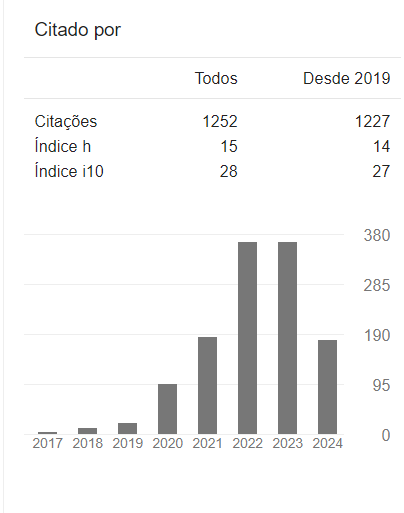THE PROPOSAL OF SOLIDARITY ECONOMY, IN CHEMISTRY CLASSES, THROUGH A DIDACTIC SEQUENCE BASED ON THE SOCIAL CHEMICAL THEME SOAP IN HIGH SCHOOL
DOI:
10.23926/RPD.2021.v6.n2.e060.id1086Keywords:
Chemistry Teaching, Socio-Environmental issues, Solidarity Economy, SoapAbstract
The article relates Solidarity Economy and Chemistry Teaching. The objective was to raise and analyze the contribution and sociopolitical function of the theme soap production from reusable oil. It was based on a Didactic Sequence built from the perspective of Science, Technology, Society (STS) interaction, with the aid of the constructive-interpretative methodology that presupposes active and creative participation in a system of activities. Thus, the Sequence was developed in a public school and we bring the analysis of a student with information collected through short inductor sentences complements. The results pointed to the relationship between Solidarity Economy related to soap production, with emphasis on significant singular dimensions such as economic, social and environmental degradation, which refer to the valorization of both the performance in society and in the future. Contributions of the proposed thematic interactions were noticed in the sense of connecting the conceptual dimension to the scientific, technological and social dimensions.
Downloads
Metrics
References
BOOF, Leonardo. Sustentabilidade: o que é, o que não é. Petrópolis, RJ: Vozes, 2012.
BRASIL. Base Nacional Comum Curricular (BNCC). Educação é a base. Brasília: MEC/CONSED/UNIDME, 2018.
DELIZOICOV, Demétrio; ANGOTTI, José André; PERNAMBUCO, Marta Maria. Ensino de Ciências: fundamentos e métodos. 4. ed. São Paulo: Cortez, 2011.
FREIRE, Paulo. Pedagogia do oprimido. 8. ed. Rio de Janeiro: Paz e Terra, 2019.
GADOTTI, Moacir. Economia Solidária como práxis pedagógica. São Paulo: Editora e Livraria Instituto Paulo Freire, 2009.
GONZÁLEZ REY, Fernando. Subjetividade e saúde: superando a clínica da patologia. São Paulo: Cortez, 2011.
SANTOS, Wilson Luiz Pereira dos. O Ensino de Química para formar o cidadão: principais características e condições para a sua implantação na escola secundária brasileira. Dissertação de Mestrado em Educação – Faculdade de Educação, Universidade Estadual de Campinas, Campinas, SP, 1992.
SANTOS, Wilson Luiz Pereira dos; AULER, Décio. CTS e educação científica: desafios, tendências e resultados de pesquisas. Brasília: Editora da UnB, 2011.
SANTOS, Wilson Luiz Pereira dos; SCHNETZLER, Roseli Pacheco. Educação química: compromisso com a cidadania. Ijuí, RS: Unijuí, 2010.
SBPT. Sociedade Brasileira de Pneumologia e Tisiologia. Disponível em: https://sbpt.org.br/portal/covid-19-oms//. Acesso em: 16 maio 2020.
MITJÁNS MARTÍNEZ, Albertina; GONZÁLEZ REY, Fernando. Psicologia, Educação e Aprendizagem Escolar: Avançando na Contribuição da Leitura Cultural Histórica. São Paulo: Cortez, 2017.
SINGER, Paul. Introdução à economia solidária. São Paulo: Editora Fundação Perseu Abramo, 2002.
TACCA, Maria Carmen Vilela Rosa; GONZÁLEZ REY, Fernando. Produção de Sentidos Subjetivo: As singularidades dos Alunos no Processo de Aprender. Psicóloga Ciência, Brasília, v. 28, n. 1, p. 138-161, 2008.
ZABALA, Antoni. A prática educativa: como ensinar. Tradução: Ernani F. da F. Rosa. Porto Alegre: Artmed, 1998.
Downloads
Published
How to Cite
Issue
Section
License
Copyright (c) 2023 A Revista Prática Docente tem o direito de primeira publicação

This work is licensed under a Creative Commons Attribution-NonCommercial 4.0 International License.
Authors who publish in this journal agree to the following terms:
- Authors retain the copyright and grant the journal the right of first publication, with the paper simultaneously licensed under the Licença Creative Commons Attribution allows the sharing of the work with acknowledgment of authorship and initial publication in this journal.
- Authors are authorized to take additional contracts separately, for non-exclusive distribution of the version of the work published in this journal (e.g. publish in institutional repository or as a book chapter), with acknowledgment of authorship and initial publication in this journal.











